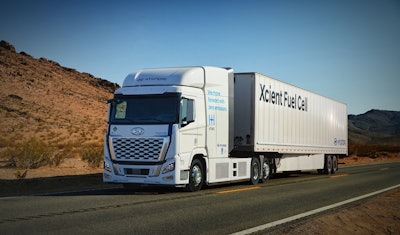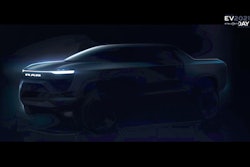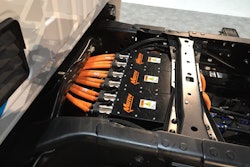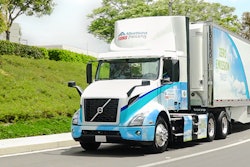
Hyundai Motor Company Monday said it plans to deploy the company's latest hydrogen fuel cell electric heavy-duty trucks in California as part of two publicly funded projects slated to improve air quality in the region. The demo trucks that Hyundai will import into the U.S. are based on XCIENT Fuel Cell, the world's first mass-produced hydrogen-powered, heavy-duty truck.
Debuting last year in Switzerland, XCIENT Fuel Cell has logged more than 620,000 miles over about 11 months of service. During that time, Hyundai claims the fleet has reduced CO2 emissions by an estimated 630 tons compared to diesel-powered vehicles.
The U.S. model provides a maximum driving range of 500 miles because the hydrogen will be stored in greater quantity on the vehicle in tanks rated at 700 bar, or about 10,000 psi, of pressure. The maximum gross combination weight of Class 8 XCIENT Fuel Cell truck will be more than 37 tons, or about 82,000 pounds.
Hyundai Motor was also awarded a $500,000 grant from the South Coast Air Quality Management District (South Coast AQMD) to demonstrate in Southern California two Class 8 XCIENT Fuel Cell heavy-duty trucks. Largely funded by the U.S. Environmental Protection Agency (EPA), the project contributes to the attainment of clean air standards in the South Coast Air Basin by reducing emissions from diesel trucks.
Hyundai and its fleet partner plan to begin operating these trucks next month for long-haul freight operations between warehouses in southern California for a 12-month period. Hyundai will also work with First Element Fuel (FEF), to utilize three hydrogen refueling stations in the region to refuel the trucks.
"We look forward to seeing this important fuel cell project from Hyundai come to life," said Ben J. Benoit, South Coast AQMD's Governing Board chair. "The development of long-haul zero-emission truck technology is key to reducing emissions that will provide immediate benefits to our air and our communities."
Deploying 30 XCIENT fuel cell trucks in northern California by mid-2023
Hyundai Motor teamed with public and private partners in the U.S. to operate 30 units of Class 8 XCIENT Fuel Cell trucks beginning in the first half of 2023 – the largest commercial deployment of Class 8 hydrogen-powered fuel cell trucks in the U.S.
A consortium led by the Center for Transportation and the Environment (CTE) and Hyundai Motor recently won $22 million in grants from the California Air Resources Board (CARB) and the California Energy Commission (CEC) and $7 million in additional grants from the Alameda County Transportation Commission and the Bay Area Air Quality Management District in support of this project.
Hyundai's NorCAL ZERO project, also known as Zero-Emission Regional Truck Operations with Fuel Cell Electric Trucks, will deploy 30 XCIENT units with a 6x4 drive axle configuration to Glovis America, a logistics service provider, by the second quarter of 2023. The consortium also plans to establish a high-capacity hydrogen refueling station in Oakland, California that will be able to support as many as 50 trucks with an average fill of 30 kilograms.
Hyundai Motor was able to gain the support of California funding agencies and local communities to demonstrate its hydrogen fuel cell heavy-duty commercial vehicles, in large part due to the XCIENT Fuel Cell truck's proven track record in Europe. Hyundai announced last year it plans to deliver 1,600 XCIENT Fuel Cell trucks to Europe by 2025. The first 46 units were delivered to Switzerland in 2020.
Based on the experience gathered from the initial demonstrations, Hyundai expects to accelerate efforts to officially launch its zero-emission commercial trucks in North America, and is already in talks with multiple logistics and commercial companies that are interested in leveraging hydrogen technology for their freight delivery and drayage services in the U.S.











